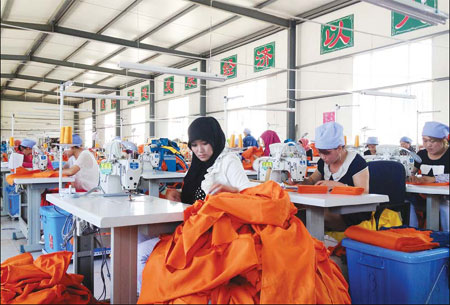Fertile fields and the Islamic connection
Updated: 2013-08-23 10:35
By Zhong Nan (China Daily)
|
|||||||||||
|
Workers make clothes at Yinchuan Wantini Clothing Co Ltd. Zhong Nan / China Daily |
The Middle East means new prosperity for clothiers
Just as sightings of the crescent moon indicate the arrival of the Islamic holy month of Ramadan, rising sales to the Middle East are pointing to more prosperous times for some of the garment makers of Yinchuan.
One such company is Yingchuan Wantini Clothing Co Ltd, which employs 230 people. Yang Faxiang, the company chairman, says: "Even though our exports to Europe and domestic sales have not been that rosy in the past few years because of the uncertain market conditions, demand for our clothes has grown considerably in the Middle East."
Yang, 64, says rising costs of imported materials, logistics and labor have forced a number of Arabic countries such as the United Arab Emirates, Saudi Arabia and Jordan to turn their attention to garment factories in Yinchuan, the buyers and the sellers having a common culture.
"Because we have eight large competitors in Yinchuan, I realized we needed to do something different," Yang says. "We decided to change our main product from traditional Muslim dresses to Islamic style garments for export to the Middle East, because there is less competition in that field."
He says that with this change in strategy his company has reallocated resources and readjusted capacity to a specific market and an online shopping business.
Wantini Clothing opened its first warehouse and direct-sale store in Riyadh, Saudi Arabia, to support its market presence in the Middle East last year. In April it gained market access for selling school uniforms to Mauritania, an Arab Maghreb country in West Africa.
Four years ago, orders from the Middle East accounted for 40 percent of Wantini's business. At that time, the markets of the Middle East, Muslim communities in Western Europe and China's western regions such as the Xinjiang Uygur autonomous region and Qinghai province dominated the export business of Yingchuan's garment industry. By last year, boosted by orders from Gulf states, Tunisia and Morocco, the value of the company's Islamic-style garment exports for different public utilities, schools and police force reached $4.6 million (3.45 million euros) last year, accounting for 95 percent of its exports.
The company has 12 Chinese and seven Saudi employees in Riyadh and hopes to open a store in Doha next year. Free Arabic language lessons are available in Yang's factory after the daily shift each Thursday evening.
Unlike contracts for heavy industries, manufacturers rely largely on circulating capital to complete the orders. The biggest concern for most Chinese garment exporters is that foreign companies place orders through a commonly recognized credit system and pay only after goods are delivered.
Ma Yixuan, general manager of Yinchuan Wogefei Garment Co Ltd, says many Chinese factories in Zhejiang or Jiangsu worry that they stand to incur heavy losses if foreign buyers do not pay.
"We have no such problem of doing business with Arabic clients because our trust is based on religious doctrine," Ma says. "There are no cheats."
Garment companies in Yinchuan should focus more on creating independent brands and high value-added products, he says.
"Most companies in Yinchuan concentrate too much on original equipment manufacturing businesses or in making copies of well-known Islamic brands. They have no brand building or capital enhancement plans to offer. They need to try to improve their design capabilities or set up regional sales networks in certain Arabic countries."
With an eager eye on the Middle East, the company launched a brand called Cifura in 2011 for high-end and silk Islamic hijabs, dresses, shirts and skirts. The strategy seems to be working as the company had sales of about 41 million yuan ($6.7 million; 5.03 million euros) from the Middle East market last year.
Ma says his company usually employs more than 50 additional workers before Ramadan, in the ninth month of the Islamic calendar, the busiest season for its export business.
zhongnan@chinadaily.com.cn
(China Daily European Weekly 08/23/2013 page16)
Today's Top News
List of approved GM food clarified
ID checks for express deliveries in Guangdong
Govt to expand elderly care
University asks freshmen to sign suicide disclaimer
Tibet gears up for new climbing season
Media asked to promote Sino-Indian ties
Shots fired at Washington Navy Yard
Minimum growth rate set at 7%
Hot Topics
Lunar probe , China growth forecasts, Emission rules get tougher, China seen through 'colored lens', International board,
Editor's Picks

|

|

|

|

|

|






